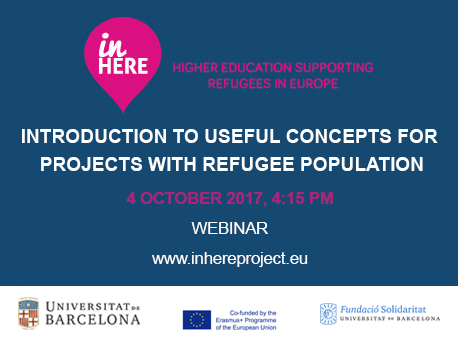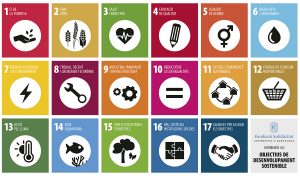The event, led by Georgios Milios, lecturer of Law at the University of Barcelona, will take place on Wednesday October 4, at 4:15 p.m.
On Wednesday, October 4 at 4:15 p.m., the inHERE project (Higher Education Supporting Refugees in Europe) will organize its first webinar, titled “Introduction to useful concepts for projects with refugee population”.
The main aim of inHERE project is to create opportunities for the refugees to take part in the European Higher Education Area. In order to do so, inHERE strengthens knowledge exchange, peer-support and academic partnership to ease the access and integration to European Higher Education Institutions (HEI) for the refugees.
Webinars are framed within the second series of the project, Living Lab, which is led by the University of Barcelona. Their purpose is to share, exchange, assess and jointly create initiatives, projects and activities for University communities to promote the integration of refugee students in HEI.
Specifically, the aim of the first webinar is to clarify some of the ideas related to legal and social concepts such as refugee, asylum seeker, migrant, refugee-like situation, asylum, subsidiary protection and its implementation. The proper understanding of these concepts is essential to work with refugee people and manage the implications of projects and activities. The webinar speaker will be Dr. Georgios Milios, professor at the Faculty of Law of the University of Barcelona.
The free event, which will be given in English, is aimed at members of University communities (teaching staff or PDI, administration and service staff or PAS, students…) who are carrying out or want to carry out any project or activity in order to ease the access of refugees to HEI, their social integration…, as well as to those in the University communities who are interested in these initiatives.
Registrations can be submitted in this link.
Inquiries: cjerez@ub.edu
inHERE is co-funded by the Erasmus+ Programme of the European Union and coordinated by the Mediterranean Universities Union (UNIMED). In addition to the University of Barcelona and UNIMED, the partners of the project are the European Universities Association (EUA), La Sapienza University of Rome and Campus France. The United Nations High Commissioner for Refugees (UNHCR) is an associate member.








